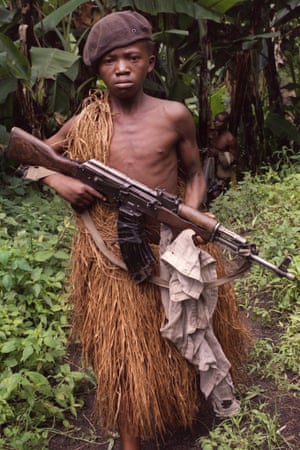Britain is continuing to defy the UN by selling arms to countries where child soldiers are routinely used or where youngsters are targeted in war zones. Before the world’s largest arms and security fair, which starts in London on Tuesday, the government is ignoring UN requests that it “expressly prohibit” such sales.
New figures reveal that of the 23 countries listed by the UN for grave violations against children or where child soldiers are used, the UK sold military equipment to 19 during the past five years. They also reveal that between June 2010 and March 2015 the government approved military licences worth more than £735m to countries blacklisted by the UN committee responsible for protecting the rights of the child.
Fresh concerns over the government’s relationship with the British arms industry are compounded by the confirmation that several regimes condemned for their record on human rights received an official invitation to the Defence and Security Equipment International Exhibition exhibition in London’s Docklands.
The countries invited that are also the subject of criticism from campaigners for gross infringements of civil liberties are Angola, Azerbaijan, Egypt, Kazakhstan and Thailand.
On Thursday, the European parliament urged the Azerbaijan government to “immediately end its crackdown on civil society and human rights work” and referred to a “deteriorating situation of human rights in Angola”.
In Egypt, fears are mounting that the rule of law is unravelling alongside a heightened sense of impunity among the military since President Mohamed Morsi was removed from power in 2013.
Three countries asked to send a delegation to the fair – Saudi Arabia, Pakistan and Colombia – are on the Foreign Office’s own list of “countries of concern”.
The fair British weapons manufacturers to almost 3,000 VIPs ranging from senior generals to defence ministers. Campaigners say the government’s attitude to selling arms is evident from the volume of sales to countries where they are used by children or are used to target them.
Andrew Smith of British group Campaign Against Arms Trade said: “These arms sales are not just numbers on a page, they can have a very real and destructive impact on the situation on the ground. There can never be a mechanism for effective arms control in conflict zones; arms sales exacerbate tensions and reveal the hypocrisy at the heart of UK foreign policy.”
The countries where the UK has approved arms sales but where there is evidence that child soldiers are active include the Democratic Republic of the Congo, where hundreds of children have been recruited to armed groups and where Britain has sold £2.4m of military hardware since 2010.
Elsewhere, the UK has approved exports worth £115m to Pakistan including equipment to manufacture rifles and components for combat helicopters. The latest UN Security Council update censures the country for the “recruitment of children by armed groups, including reportedly for use as suicide bombers”.
Somalia has received £6.7m of arms from the UK, including assault rifles, ammunition and vehicles, despite the UN documenting “the recruitment and use of 1,293 children” by al-Shabaab and the Somali National Army.
Thailand received £38m of arms from the UK during that period – including weapons sight mounts and components to manufacture artillery ammunition – despite the UN receiving reports concerning the recruitment and use of girls and boys as young as 14 by armed groups.
In South America, Colombia has received £19m of military equipment from Britain over the last five years with the UN verifying a number of cases of recruitment and use of children by armed groups in 25 regions and in Bogotá, including by Farc rebels and the country’s National Liberation Army.
“Despite all of its talk about promoting human rights and democracy, the UK government has consistently sold arms into some of the most war-torn countries in the world,” added Smith.
The Foreign Office maintains that human rights violations are a “key part of its assessment” when approving arms exports and that sales are refused if there is a risk weapons could be used by or against children.
The UN committee on the rights of the child recommends that the UK “expressly prohibit, within its legislation, sale of arms to countries where children are known to be or may potentially be recruited or used in hostilities”.
When pressed on the issue earlier this year, the Foreign Office minister Tobias Ellwood responded in parliament by saying the UK “operates one of the most rigorous and transparent arms export control regimes in the world”.
 A child soldier in the Democratic Republic of Congo. British-manufactured arms could be sold there. Photograph: Abdelhak Senna/AFP
A child soldier in the Democratic Republic of Congo. British-manufactured arms could be sold there. Photograph: Abdelhak Senna/AFP